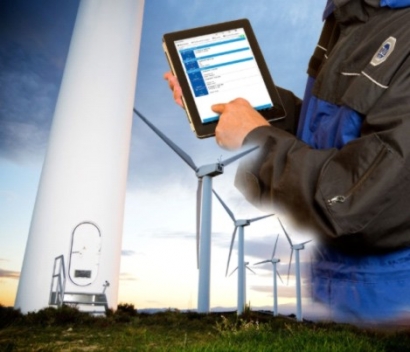
TÜV SÜD is a certification body for offshore wind farms approved by the German Maritime and Hydrographic Agency (Bundesamt für Seeschifffahrt und Hydrographie, BSH). It holds accreditation as a certification body for onshore and offshore wind turbines and their components, and as a testing laboratory for the measurement of wind resources, turbulence and energy yield.
WTG Assessment
When the design life of a wind turbine generator approaches its end, the operator must decide whether to dismantle, modernize or continue to operate the turbine. Assessment and examination of the lifetime extension shows whether a WTG or wind farm is suitable for continued operation.
“The lifetime assessment looks at various aspects, including the loads and stresses to which a wind turbine has been exposed throughout its service life up to that point,” explained Dr. Martin Webhofer, head of wind energy at TÜV SÜD Industrie Service GmbH.
The assessment uses computer simulations which take into account the design conditions according to type certification and the specific conditions at the site of the turbine’s operation. On top of this, the wind-energy experts perform an on-site inspection of the WTG to assess its state of repair. The results are documented in a report that informs the operator about the conditions under which extension of the WTG service life is possible.
“The expert report also enables a clear assessment to be made of the efforts and costs involved in life extension,” said Webhofer.
Transparently outlining the risks and opportunities involved in continued operation, this report establishes a sound basis for decision-making.
Site Specific Design Certificate
Wind-farm profitability can be significantly improved by adjusting the design of a turbine to reflect the conditions prevailing at its site of operation. Such adjustment may concern the design of the tower and the foundation, the turbine control system or the rotor and nacelle, without compromising on the advantages of platform design. TÜV SÜD's Site Specific Design Certificate now offers manufacturers and project developers the opportunity to verify that their optimized turbines are ideally suited to a specific site. Certification is based on design examination of the platform certificate and includes additional site-specific factors.
Certification of floating foundations of offshore wind turbines
Using floating foundations, offshore wind turbines can also be realized in deepwater areas. In a pilot project, TÜV SÜD has further improved its certification of floating foundations to ensure the safe and reliable use of this innovative support structure. The pilot project of an industrial consortium under the leadership of Spanish engineering and consulting firm ESTEYCO combines a floating foundation and a telescopic tower. During sea transport, the foundation acts as a floating barge and the telescopic tower is retracted to ensure stability. The pilot project is a pre-stage of the development of floating foundations, which involve a floating structure that is ballasted to rest on the seabed and support the WTG. During installation, the foundation is lowered to the seabed and the telescopic tower extended.
Digital WTG inspection
TÜV SÜD has developed a database-supported IT solution for WTG inspection, assessment of the state of repair and evaluation of the inspection results. The fully digital inspection combines efficient inspection processes with well-structured data collection. The solution is undergoing continual further development and improvement. As the next step, TÜV SÜD plans to give operators access to interactive defect statistics for their wind turbines.

